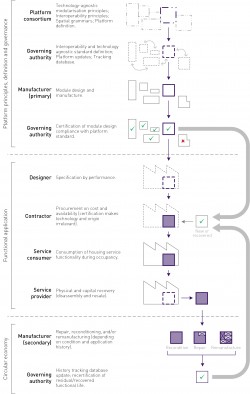Dr Derek Thomson of Loughborough University’s School of Architecture, Building and Civil Engineering introduces the concept of interoperable modules and how they can bring the next wave of modernisation – open platforms with servitisation.
Modular construction is becoming mainstream due to reduced site time and enhanced quality. Competing manufacturers currently market systems that adopt alternative, incompatible technologies and tightly integrate modules to maximise functionality and usable space. These modular systems are proprietary and inaccessible, optimising initial construction but disadvantaging clients and building operators through-life. Manufacturers chase market share by differentiating on production technologies.
The tight module integration and technology-specificity of proprietary systems means that, when embedded components fail, needs change or buildings are refurbished, components are hard to replace. Volumetric modules are often structural and cannot be removed. Components are not modular and are often enmeshed in their surrounding modules because traditional assembly methods are still used in offsite prefabrication.
What would happen if integration was slackened? What if system efficiency was exchanged for through-life performance? What if modules and components were interoperable: able to be used anywhere, no matter their production technologies or those of the surrounding building system? Enabled by an open platform that defines module envelopes and interconnections, interoperable components could be deployed in any building where that platform is used. Manufacturers could deploy interoperable components within a service wrapper, sustaining relationships with building operators by assuring functional performance when maintaining or altering buildings – irrespective of module or component production technologies or even whether they are new or remanufactured.
Interoperability negates proprietary lock-in, requiring manufacturers to compete on service. The enabling open platforms are governed for mutual benefit by strategic alliances between designers and manufacturers. Platforms are technology-agnostic, allowing modules and components to work together irrespective of their production technologies because functionality, size and interconnections are standardised. The platform gives building designers flexibility on system selection. It assures operators that components will fit, can be replaced and will perform.
Manufacturers produce to the platform to decouple output from specific projects knowing that their compliant modules can be deployed anywhere the platform is present. Manufacturers select production technologies for competitive advantage. Interoperability introduces additional modularisation overhead to the building system, trading some spatial inefficiency for through-life system efficiency. This overhead would be defined as the standardised interfaces (functional, structural, mechanical and so forth) that enable module integration during assembly and their ‘plug and play’ exchange and reconfiguration during maintenance and adaptation. For example, a framed structure would be required, negating one of the clear benefits of cross laminated timber (CLT) systems.
But the through-life trade-off of the servitised business models that interoperability enables are deeply compelling and the general direction of business in multiple sectors. Open platforms and interoperable components, together with servitised provision of functionality, create new forms of value. By widely deploying the open platform and supporting building performance through-life via a service wrapper, manufacturers can decouple production from projects, replace unpredictable capital income with predictable revenue streams.
This is deeply compelling. It creates a stable operating environment to increase capital intensity of production for competitive advantage and to overcome skills shortages.
Derek Thomson will be presenting all these possibilities at the Modular Matters conference on 30 October. He is actively investigating this area.
If these concepts interest you, please contact him at email: d.s.thomson@lboro.ac.uk
To view this article in Offsite Magazine, visit: Offsite Magazine Issue 12









